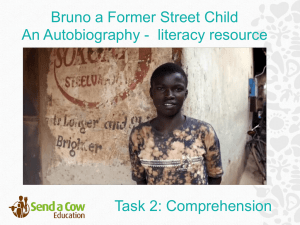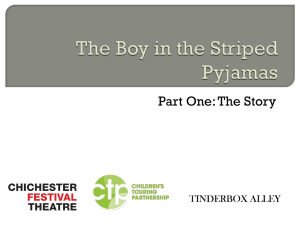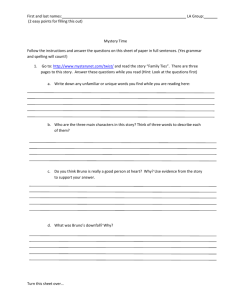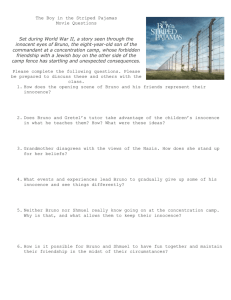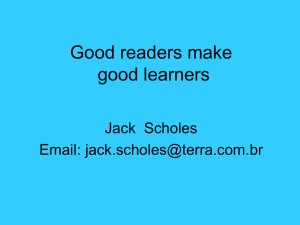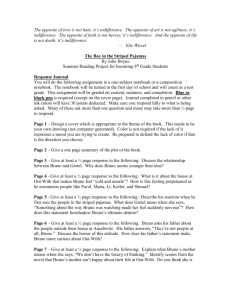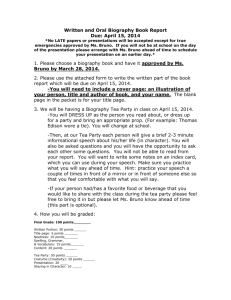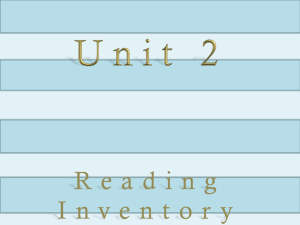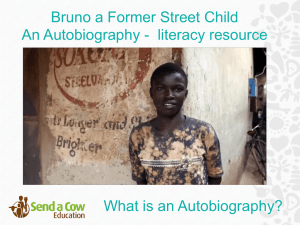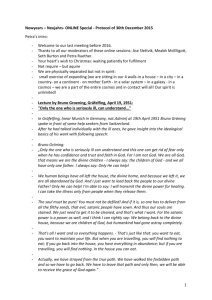"The Boy in the Striped Pajamas" Study Guide
advertisement
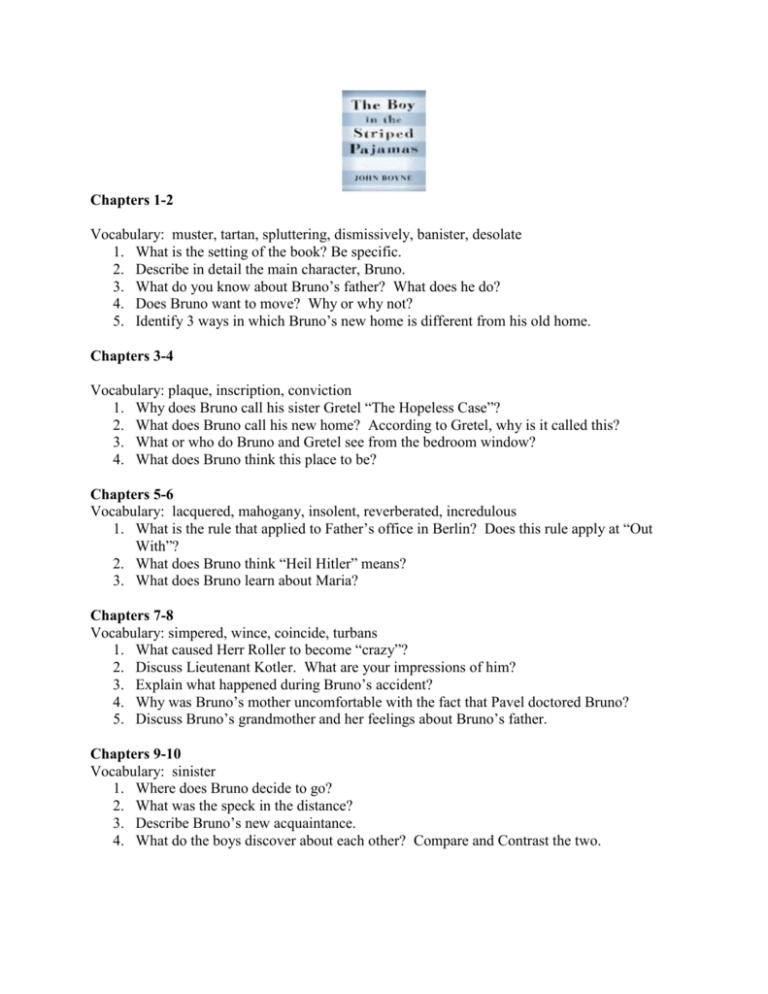
Chapters 1-2 Vocabulary: muster, tartan, spluttering, dismissively, banister, desolate 1. What is the setting of the book? Be specific. 2. Describe in detail the main character, Bruno. 3. What do you know about Bruno’s father? What does he do? 4. Does Bruno want to move? Why or why not? 5. Identify 3 ways in which Bruno’s new home is different from his old home. Chapters 3-4 Vocabulary: plaque, inscription, conviction 1. Why does Bruno call his sister Gretel “The Hopeless Case”? 2. What does Bruno call his new home? According to Gretel, why is it called this? 3. What or who do Bruno and Gretel see from the bedroom window? 4. What does Bruno think this place to be? Chapters 5-6 Vocabulary: lacquered, mahogany, insolent, reverberated, incredulous 1. What is the rule that applied to Father’s office in Berlin? Does this rule apply at “Out With”? 2. What does Bruno think “Heil Hitler” means? 3. What does Bruno learn about Maria? Chapters 7-8 Vocabulary: simpered, wince, coincide, turbans 1. What caused Herr Roller to become “crazy”? 2. Discuss Lieutenant Kotler. What are your impressions of him? 3. Explain what happened during Bruno’s accident? 4. Why was Bruno’s mother uncomfortable with the fact that Pavel doctored Bruno? 5. Discuss Bruno’s grandmother and her feelings about Bruno’s father. Chapters 9-10 Vocabulary: sinister 1. Where does Bruno decide to go? 2. What was the speck in the distance? 3. Describe Bruno’s new acquaintance. 4. What do the boys discover about each other? Compare and Contrast the two. Chapters 11-12 Vocabulary: enunciation, disdain, contradiction 1. What ground rules are set for Bruno to follow when the guests arrive? 2. Explain Shmuel’s life before being brought to “out-with.” 3. What secret does Bruno decide to keep? Chapters 13-14 Vocabulary: incumbent, flounced 1. What do Bruno and Shmuel want to be when they grow up? 2. Discuss what occurred between Kotler and Pavel. Chapters 15-16 Vocabulary: inconsolable, dwindling 1. What did Bruno do t hat made Shmuel get in trouble? 2. Why did Bruno leave “out-with” for a few days? 3. What does Bruno Remember most about his grandmother? 4. What does Gretel tell Bruno about the people on the other side of the fence? Chapters 17-18 Vocabulary: dreaded 1. Why is Bruno not relieved to be moving back to Berlin? 2. What prompted Fathers to send the family back to Berlin? 3. Why is Shmuel upset? 4. Discuss the plan created by Bruno and Shmuel. 5. Make a prediction for the ending of the book. Chapter 19-20 Vocabulary: squelched, appalled 1. When Bruno switched clothes, of what was it a reminder? 2. What did Bruno expect to find on the other side of the fence? 3. Describe what Bruno saw at the camp. 4. Ultimately what had happened to Shmuel’s father? 5. Retell what happened that day and how it was responded to by Bruno’s family. List 10 events that occur in the plot that moves the story along significantly. 1. 2. 3. 4. 5. 6. 7. 8. 9. 10. Critical Thinking Questions 1. List and explain 3 themes from the book 2. A fable is a story that bears a moral lesson. In what manner is this story a fable? 3. Explain why telling the atrocities of the Holocaust from the perspective of a child was effective. 4. The fence that separates Bruno and Shmuel is both literal and figurative, explain. 5. When Hitler comes to dinner, Bruno takes an instant dislike to him. Why is this a significant detail? 6. Gretel undergoes a change in the novel. Describe the change the reader sees in her. 7. Each of the characters, though embued with individual characteristics and personalities, represent a different stereotype. Identify the stereotypes of the following characters: Bruno Mother Father Kotler Pavel Gretel Grandmother Shmuel 8. Boyne’s ending is an unsettling one. Why do you think that it was necessary to end the book this way? 9. Discuss 3 symbols that are present in the book. 10. Having read the book, what is your lasting impression and opinion of it? The Boy in the Striped Pajamas Essay Questions 1.Discuss the relationship between Bruno and Gretel. Why does Bruno seem younger than nine? In a traditional fable, characters are usually one-sided. How might Bruno and Gretel be considered one-dimensional? 2.At age 12, Gretel is the proper age for membership in the League of Young Girls, a branch of Hitler’s youth Organization. Why do you think she is not a member, especially sincer her father is a high-ranking officer in Hitler’s army? 3.What is it about the house at Out-With that makes Bruno feel “cold and unsafe”? How is this feeling perpetuated as he encounters people like Pavel, Maria, Lt. Kotler, and Shmuel? 4.Describe his reaction when he first sees the people in the striped pajamas. What doe Gretel mean when she says “Something about the way [Bruno] was watching made her feel suddenly nervous”(p.28)? How does this statement foreshadow Bruno’s ultimate demise? 5.Bruno asks his father about the people outside their house at Auschwitz. His father answers, “They’re not people at all Bruno” (p.53). Discuss the horror of this attitude. How does his father’s statement make Bruno more curious about Out-With? 6.Explain what Bruno’s mother means when she says, “We don’t have the luxury of thinking” (p.13) Identify scenes from the novel that Bruno’s mother isn’t happy about their life at Out-With. Debate whether she is unhappy being away from Berlin, or whether she is angry about her husband’s position. How does Bruno’s grandmother react to her sons’ military role? 7.When Bruno and his family board the train for Auschwitz, he notices an over-crowded train headed in the same direction. How does he later make the connection between Shmuel and that train? How are both trains symbolic of each boy’s final journey? 8.Bruno issues a protest about leaving Berlin. His father responds, “Do you think that I would have made such a success of my life if I hadn’t learned when to argue and when to keep my mouth shut and follow orders?” (p.49) What question might Bruno’s father ask at the end of the novel? 9.A pun is most often seen as humorous. But, in this novel the narrator uses dark or solemn puns like Out-With and Fury to convey certain meanings. Bruno is simply mispronouncing the real words, but the author is clearly asking the reader to consider a double meaning to these words. Discuss the use of this wordplay as a literary device. What is the narrator trying to convey to the reader? How do these words further communnicate the horror of the situation? 10.When Bruno dresses in the filthy striped pajamas, he remembers something his grandmother once said. “you wear the right outfit and you feel like the person you’re pretending to be” (p. 205). How is this true for Bruno? What about his father? What does this statement contribute to the overall meaning of the story? 11.Discuss the moral or message of the novel. What new insights and understandings does John Boyne want the reader to gain from reading this story? 12.Dystopia is defined as a society characterized by human misery, as squalor, oppression, disease and overcrowding. How is a dystopia different from a utopia? How is this novel an example of a dystopia? Explain. Character Chart Relationship to Others Bruno Mother Father Gretel Shmuel Lieutenant Kotler Physical Description Actions Impact on the Novel Herr Liszt Childhood Friend (Martin, Karl, Daniel) Adolf Hitler Pavel Maria Grandfather Grandmother
